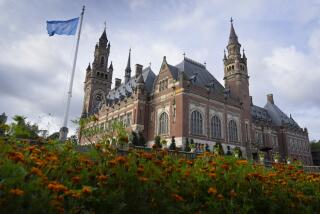Milosevic Sneers at Court, Challenges Its Legitimacy
THE HAGUE — After nearly two days of listening to charges that he led a blood-drenched campaign of terror in the Balkans, Slobodan Milosevic on Wednesday angrily challenged the legality of the international court trying him for war crimes.
The former Yugoslav president told a three-judge panel at the end of Wednesday’s court session in the Netherlands that his arrest was illegal and that the trial violated his human rights. In his first statements since his trial began Tuesday, Milosevic also accused Carla Del Ponte, chief prosecutor of the International Criminal Tribunal for the Former Yugoslavia, of orchestrating a “parallel trial” and “lynching” in the media.
“I challenge the very legality of this tribunal,” Milosevic declared. “This tribunal does not have the competence to try me. . . . This is of prime importance for international law and justice in general.”
Chief Judge Richard May interrupted, reminding Milosevic that the U.N. court had rejected those same arguments in a pretrial hearing.
“The matters on which you are choosing to address us are matters on which we have already ruled, as you would know if you had taken the trouble to read our decisions,” said May, a dry, no-nonsense Briton. “Your views on the tribunal are now completely irrelevant to this trial.”
The defendant’s protest and the judge’s retort set the stage for Milosevic’s defense argument, scheduled for today. The former strongman is expected to deliver a counterattack full of the combative fervor that marked his years in power and his months in disgrace.
Hinting at one line of defense, Milosevic complained Wednesday that the case against him is based on evidence provided and manipulated by British intelligence services.
“We all know intelligence services give out selective information and details,” Milosevic said.
Although he sneers at the court and may do his best to destabilize the proceedings, Milosevic made it clear Wednesday that he has prepared a rebuttal to charges of genocide and other crimes he allegedly committed during conflicts in Croatia, Bosnia-Herzegovina and Kosovo during the 1990s. He faces a total of 66 counts in the three indictments.
Prosecutors on Wednesday focused mainly on the indictment involving Kosovo, a province of Serbia, Yugoslavia’s dominant republic. They alleged that Milosevic’s forces used systematic executions, sexual assaults and terror during the forced deportation of about 850,000 ethnic Albanians during the first six months of 1999.
Prosecutors called Milosevic the callous mastermind of the operation and said evidence also implicates him in an attempted cover-up in which soldiers dug up mass graves and moved the corpses to secret burial sites near Belgrade, the Yugoslav and Serbian capital. Investigators discovered the bodies last year.
Prosecutor Dirk Ryneveld used maps, videos and photos to recount the saga of ethnic Albanians in Kosovo, whose forced exodus into neighboring Albania, Macedonia and Yugoslavia’s smaller republic, Montenegro, caused the North Atlantic Treaty Organization to unleash a punishing air campaign against the Milosevic regime. The images showed hills strewn with corpses, refugees bent against cold winds, bedraggled columns herded by Serbian troops.
Ryneveld said a witness whom he identified as a “senior international official” will testify that Milosevic, when asked about the abuses inflicted on the refugees, responded “that the people he had seen were on a picnic.”
In general, the prosecutor’s opening statement offered little information about much-anticipated testimony from witnesses who were part of the Milosevic regime and are crucial to connecting him to crimes by his troops. That may be because prosecutors are still putting the final touches on the witness list.
The Kosovo case seems the most straightforward because Milosevic was the president of Yugoslavia at the time. His place atop the chain of command is therefore clear. As for the two other cases, he wielded vast power in Croatia and Bosnia while president of the neighboring Serbia republic, but he was not the official commander in chief of the forces accused of abuses there.
In Kosovo, as in the other cases, there was a distinct plan and pattern to the brutality against non-Serbs, Ryneveld said. Witnesses will take the court on a heart-wrenching visit back to the killing fields, he said. The prosecutor sketched the ordeal of one witness, a survivor of the massacre of seven women and 12 children in April 1999 in Kosovo.
The victims took refuge in a basement in one of the housing compounds common among extended Albanian families. But Serbian and Yugoslav soldiers stormed in and shot them all, according to the prosecutor.
A 10-year-old boy survived the gunfire. He realized that his toddler sister also was alive, but she was trapped under the corpses of their mother and cousins, according to the prosecutor.
“He could hear her calling to him,” Ryneveld said. “Because he was wounded himself, he was unable to lift his mother’s body to save his sister.”
The boy got out of the house before the soldiers burned it to the ground, their victims along with it, Ryneveld said.
“The memories still haunt him,” he said. “That boy will testify to this tribunal about those horrific events. . . These people are not just statistics. They are innocent civilians who by no stretch of the imagination could be considered legitimate military targets.”
As the prosecutor spoke in a quiet courtroom, Milosevic leaned forward behind the defense table, looking intent, seeming to strain toward the moment when he will get his chance to respond.
More to Read
Sign up for Essential California
The most important California stories and recommendations in your inbox every morning.
You may occasionally receive promotional content from the Los Angeles Times.










